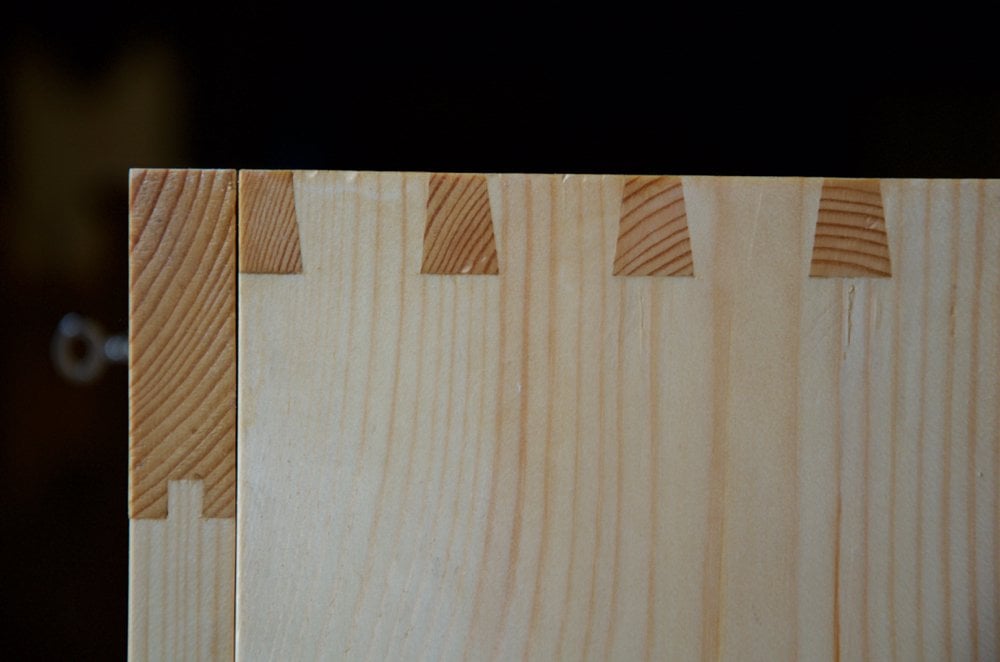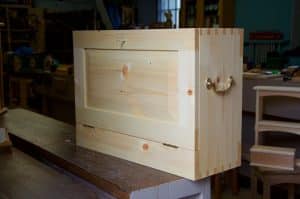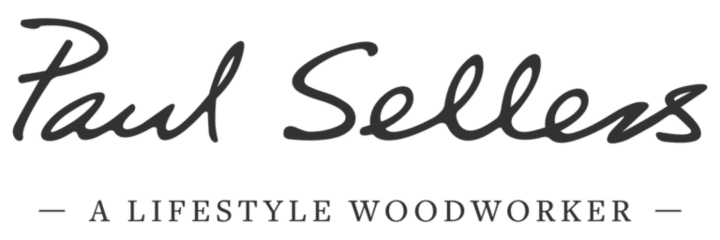Why I do what I do
Often it’s the unexplainable things of life that make the most sense to our sensibilities. Strange really, when you think about it. The leaf a tree carries and the way wood severed from it’s root in the same stem brings life to what we make from it. These things are things a scientist explains and then fragments what he or she analyses to reconfigure aspects of it to create something saleable to make money.
I think that science proves a few things we already know and understand. Many things, really, but then comes the disintegration of all the constituent parts and we end up with MDF and phenolic resins, pressed fibreboard and plastic laminate. No matter how I slice it, the tool box wouldn’t be the same in MDF.
For a while there, because of a TV show or two mostly, people lost interest in doing it themselves and let a machine do the work for them and we almost lost our sense of wellbeing in the progress of it. Mostly, for me anyway, it’s been more seeing natural things being displaced if you will and then reformed into artificial substitutes commercial enterprises convert into something called economy and industrialism. This includes people too of course–humanity considered as fodder in the pursuit of ever expanding consumerism we call markets. 
I am convinced there is a need for human recovery in every person living that results from commerced life to recover some sanity that goes well beyond using commercial methods of industry to give us a place where we can rest from it. I am also convinced that the process of working with our hands contains the whole process to a speed we can understand and recover ourselves from by mastering skills and better understanding the different woods we work with and the tools we use. I think these things are important enough to me for me to write 2-3,000 words every day for people to read. It’s worth giving up my free time in the evenings and weekends to make my days longer and extended beyond my working hours of making, and teaching and building to build a more secure future for people to recover in and at the same time preserve my craft. I do not believe that without this effort, apprenticeships and that art of my work as a crafting artisan will be safe. Certainly no politician or industrialist can be entrusted in any way with it. Of course it’s not just my one craft I speak of. It’s spinners and weavers warping treadle looms and blacksmiths in their back yards learning to form steel into things of use and beauty. Potters, basket weavers and so on.
When I speak of recovery and wellbeing I speak of progress you see. I cannot reverse the effects of living in a digital era of technology where virtual has secured its tenure as permanent reality, but I can teach people that the mental attitude towards working manually needs to change. That men and women can see work unfold from raw material into something so well made it bespeaks of an era 300 years ago when fine workmanship exemplified a worker’s respected life that was indeed sacrosanct and clean, wholesome and pure. A period when people worked within the sphere of limitation attributed to them. An allocation of time for them to learn and to grow and to understand that work was an honourable place to rest in and enjoy. I can even use that digital era of expression to advance my cause in helping others get off the conveyor belt even if only to recover for a little while and discover their own saneness is still there inside them.
For me and for thousands beside me, work is healing. That’s the other part of recovery. Recovery is to find that which was lost or damaged or abandoned. Machine and hand are not really two sides of the same coin to be flipped and seen as coequal in existence but for the main part to exact opposites. Call me a luddite if you will, but people along the way have protested against the industrialism we live and claw our way through today. But we can hold to that aspect of respect that gives us the opportunity to live and breath in the cleanness of honest work in an honest atmosphere of minimised pollution beyond commercialism and mass manufacturing. It’s a personal sphere of unindustrialised space were we close the doors to commercialism and learn to live and breath a different way. People fought hard for such freedoms so I could go to work with my hands. It wasn’t altogether the halting of progress in times past but the fight against the very giants of industrialism we face in the everyday of life today.
Two decades ago men laughed at me at woodworking shows with these few tools on top of a joiner’s workbench in Mesquite, Texas, Tulsa, Oklahoma, Kansas City, Kansas. Places like that. They were mostly the salesmen who sold machine routers and who grew bored when sales slowed and they were empty and never knew wood. 



Write on Paul,…write on!
Dear Paul:
I hope you can find the Strenght and Joy to do wat you are doing right know…the next 50 years!
(why not?)
There is no doubt that what you do, IS changing the world: the snowball is growing slowly but … surely!
Getting excited for the future and all upcoming classes!
greetings from an aprentice from Belgium.
Erland
Great thoughts! Truly those moments are something that industrialists will lnever know and money can never buy.
Paul, thank you for sharing your love and understanding of our craft with the world. By the way, I now know why I can’t find a good Preston router on Ebay – you own them all!
Thank you for pushing on and creating a space to lay out these thoughts. I mentioned too that my son jokingly called me a luddite when I first started real woodworking. I kind of wore it like a badge of honour.
I worked for a time in on a maintenance crew in a plant manufacturing MDF. Mountains of smashed up pine went in one end, was processed , mixed, squashed, cooked, cut and sanded and shoved out the other end. Coarse is a description that is apt. You had trouble seeing the other end of the facility with the airborne fibre and I used so many masks going in and out that the supply box at the door would run out. There were people working in there who never wore any. The only place of relative sanity was the veneering shed. By contrast it was quiet, considered and clean and to be frank the staff there had considerably more brain cells to knock together. At the time it was also the only profitable section of the plant. I left after repairing the side of a warehouse for the third time because a fool driving a forklift used it as a stop for loading pallets onto the tines of the forklift. The whole experience dimmed the small appreciation I had of manufactured wood products. I still use them, but only when really needed. I think it is this association as much as the lack of soul that drives that decision.
Well said, Paul–thank you.
As usual, very well said Paul.
I think real woodworking to machine operators seems silly mostly because they don’t get it. I often compare it in my mind to Plato’s “Allegory of the Cave”. They scoff because they have never tried it and think its slower and less sophisticated. They equate modernity and amperage with goodness because of their ignorance and lack of enlightenment. I was once a woodworker who was little more than a machine operator and I thought hand tool work a passé style of woodworking. I also secretly feared that it took a level of real skill that I assumed I could never attain. This was largely because outstanding examples, teachers, and mentors like you were not commonplace in my world. Machines were all I knew and all I knew there were. I thought hand tool woodworking existed only in period museums and had no idea it was a viable, vibrant, accessible, and applicable form of modern woodworking. That was before discovering that it was far more than quaint and long before I realized that I could find immeasurable fulfillment in really working with my hands. Once I realized how much it put me in harmony with this wonderful medium and my surroundings I never looked back and started divesting my shop of space-eating machinery. Although I have kept a bandsaw, jointer, planer, and lathe for big jobs, I go months without turning any of them on. In fact, I find myself gravitating to projects with manageable milling requirements so that I don’t have to destroy the serenity of my environment with dust, noise, danger, and myriad safety equipment. I am exponentially happier and wish I would have discovered hand tool woodworking and you, Paul Sellers, many years earlier.
Like others have mentioned and I am a believer as well, thank you for what you share and do. This has been a rough year for me health wise but I am getting better and I feel a whole lot safer using hand tools verse’s the tailed cousins. I still have a lot to learn but love using hand tools, thanks again.
Steve
Wow, Paul, you’re always inspiring. I’m still assembling my tools so I can begin working wood but one day I want to make it to your castle, and not just to learn woodworking.
PS, please give us an update on your next book!
Will be doing that soon. It’s coming together now.
“I also secretly feared that it took a level of real skill that I assumed I could never attain.”
I quoted this because I think it’s probably a much more common feeling than many might realize. It certainly described me. I’ve always been fascinated by woodworking, but I simply don’t want a garage full of special-purpose power tools. I took wood shop in school, but it was all machines, all the time and I hated all the noise and mess and safety issues… whatever fun there was in woodworking, for me that cancelled it all out.
When did it change? I kept wanting to buy this or that, and only being able to find cheap particle board items at ridiculous prices. Saying to my wife “you could buy the tools and materials to do that, throw away the first three you built as learning experiences, and still have paid less” became a common refrain. An exaggeration perhaps, but frequently not much of one.
But I still didn’t want a garage full of power tools.
I started trying to figure out how few tools I could have and still do the things I wanted. While researching this, I came across a video of someone planing a panel flat with a Stanley #7. I almost didn’t watch it, but I was curious; I’d never seen something like that before. By the end of that video, I knew that if I was going to do woodworking, that was the way I would do it.
Internet searches for hand-tool woodworking brought me to some of Paul’s videos. He just made everything seem so *possible*. So I bought a few cheap tools to see if I could learn sharpening, some cheap wood to practice on, and found that it was all far, far more possible than I had ever believed. My first dovetail, my first mortise and tenon… they were actually functional. Not too many practice sessions later, they also started to not look too bad.
So what have I learned? That it *is* possible. That while I will never be as skilled as Paul, I can build enough skill to do the things I want in a surprisingly short time, and that doing so is fun. And that forgoing the machines made something I gave up on many, many years ago attainable and enjoyable. So Paul, thank you especially for that.
I understand completely the peace you get from working with your hands. Especially when using hand tools. I really cannot stand the noise of power tools. For some reason they make me feel anxious and a little angry.
There are dynamics at work with machines (I never call them power tools. That was a strategy of manufacturers to get people to view them differently than what they were) that have that affect on most people and it’s because they are abnormal to us and they are designed to mass make and in most woodworker’s worlds they do not want to mass make nor get the job done yesterday but simply enjoy the process. I don;t care who the woodworker is or how much they say they are at ease with machines, they ALL are anxious about safety of themselves, others around them and the safety of their work. if they are not, I don’t want to be around them in the machine shop. Machines, every one of them, are very highly dangerous. They are intimidating and very few woodworkers have used them more than I have. They do and should scare anyone working with them. They have kept people from woodworking and they have outlawed children and young people and others too from the environment of woodworking.
After coming back into the house after an epic failure, and lots of frustration, on a dovetail box I’ve been attempting to make for the last couple nights, this post made me smile. The fact that you work so hard to put all this wonderful, useful, and FREE information out there just motivates me (and I’m sure many others) to get back out there and try it again, and remember to try and enjoy the journey! Thank you!
I’m glad it helped Bob, that’s what it’s all about, helping one another on the journey to successes.